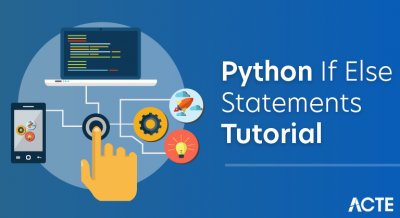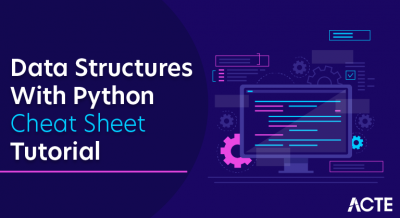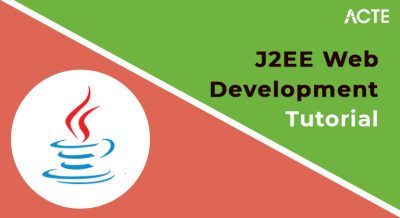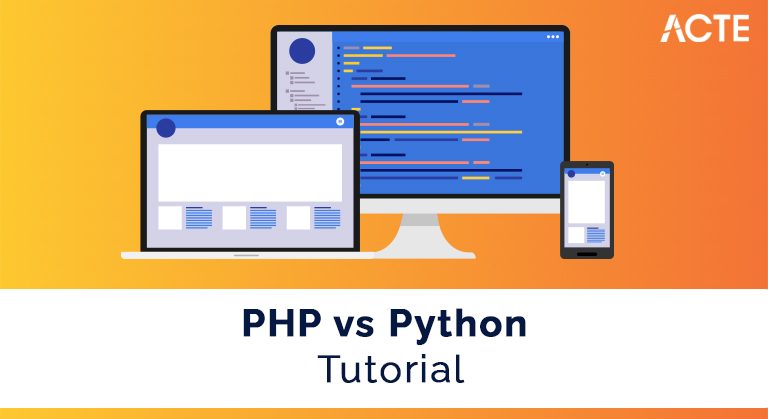
- The Significance of Comparing PHP vs Python for Web Development
- The Fundamental Differences Between PHP and Python
- The Primary Safety Concerns for Web Applications in PHP and Python
- Which Language Is More Popular for Web Development, PHP or Python?
- Key Differences in Performance Between PHP and Python
- Compare How PHP and Python Interact With Web Development Tools
- PHP Interactions
- Python Interactions
- Which Is Better, PHP or Python?
- When to Choose Python?
- When to Choose PHP?
- Python versus PHP Detailed Comparison
- Why incline toward Python over PHP?
- Which is safer, Python or PHP?
- Conclusion
- Comparing PHP and Python allows developers to select the most suitable language based on project requirements, developer expertise, and scalability needs, ensuring optimal performance and efficiency.
- Understanding the differences in community size and available resources for PHP and Python enables developers to leverage a thriving community, access extensive documentation, and receive support for web development challenges.
- PHP is specialized for web development, while Python is a versatile, general-purpose language.
- PHP follows C-style syntax, while Python emphasizes readability with indentation.
- PHP and Python have active communities and extensive ecosystems.
- PHP executes on the server side, affecting page load times. Python can be both scripted and compiled.
- PHP is commonly used for web development, while Python finds applications in various fields like web development, data science, AI, and automation.
- In PHP, primary safety concerns include SQL injection, where improper input validation can lead to unauthorized access and manipulation of databases.
- Cross-Site Scripting (XSS) is another concern, arising from inadequate data sanitization that enables attackers to inject malicious code into web pages.
- PHP web applications may face Cross-Site Request Forgery (CSRF) risks, lack of proper session management, and vulnerabilities related to file inclusion and code injection.
- Python-based web applications also need attention to safety. XSS vulnerabilities can occur when input data is not adequately sanitized, leading to malicious code execution.
- CSRF attacks are possible if there is insufficient protection against unauthorized actions on authenticated users.
- Python applications may also be prone to SQL injection due to poor handling of user input.
- To mitigate these safety concerns effectively, developers must implement best practices, and leverage appropriate security libraries to safeguard web applications in both PHP and Python.
- PHP has historically been more popular for web development due to its early dominance in server-side scripting and wide adoption in content management systems (CMS) like WordPress.
- Python has been rapidly gaining popularity in web development for its versatility, clean syntax, and powerful frameworks like Django and Flask.
- PHP and Python’s popularity in web development might vary depending on Use cases, project requirements, and regional trends.
- Both PHP and Python are still widely utilized in the web development world, and their popularity is susceptible to industry changes and advances.
- PHP follows a shared-nothing architecture, providing faster response times for simple web applications with low concurrency.
- PHP typically has lower memory overhead, making it suitable for resource-constrained environments and shared hosting.
- PHP is designed for web development tasks, with built-in features optimized for efficient handling of web-related operations.
- PHP’s interpretation can result in slightly slower execution compared to compiled languages, but it enables quick development iterations.
- PHP offers opcode caching, improving performance by storing precompiled script bytecode in memory.
- Python follows a multi-threaded architecture, making it more efficient for handling concurrent requests and parallel processing.
- Python’s general-purpose nature introduces some performance overhead compared to PHP’s specialization in web development.
- Python’s web frameworks like Django and Flask may introduce additional processing time due to their broader applicability beyond web development.
- Python can consume more memory due to its extensive standard library and object-oriented nature, impacting performance in memory-intensive applications.
- PHP’s specialization and memory efficiency make it faster for simple web applications, while Python’s versatility and concurrency support offer advantages for more complex and concurrent web projects.
- PHP provides functions like ‘mysqli_connect()’ and ‘PDO’ to connect with databases.
- PHP executes SQL queries using functions like ‘mysqli_query()’ and ‘PDO::query()’ for data retrieval and manipulation.
- PHP supports parameter binding in prepared statements, preventing SQL injection attacks by securely handling user input.
- PHP frameworks like Laravel offer Object-Relational Mapping (ORM) for simplified database interactions using object-oriented approaches.
- PHP supports database transactions with functions like ‘mysqli::begin_transaction()’, ensuring the integrity of multiple database operations.
- PHP has popular frameworks like Laravel and Symfony, providing essential features like routing, middleware, and authentication for efficient web development.
- PHP powers widely-used content management systems like WordPress and Joomla, making website creation and management accessible to non-developers.
- PHP serves as a server-side scripting language, generating dynamic web content and interacting with databases.
- PHP integrates seamlessly with web servers like Apache and Nginx, ensuring the smooth execution of PHP scripts.
- PHP’s community contributes to a rich ecosystem of libraries and extensions, enhancing security, and web development tasks.
- Python provides libraries like SQLAlchemy and Django ORM for seamless database connections.
- Python enables executing SQL queries using library functions like ‘execute()’ or Django’s QuerySet API.
- Python supports parameterized queries for secure data binding and protection against SQL injection.
- Python frameworks like Django offer robust Object-Relational Mapping capabilities, simplifying database interactions using Python objects.
- Python allows managing database transactions through library functions like ‘commit()’ and ‘rollback()’.
- Python includes potent web development frameworks like Django and Flask for quickly building applications.
- Routing and middleware functionalities are available in Python frameworks to manage URL routing and HTTP request processing.
- Python frameworks provide built-in templating engines to generate dynamic HTML content.
- Python web development tools come with authentication mechanisms and security features to safeguard web applications.
- Various web servers, including Apache and Nginx can be combined with WSGI servers like Gunicorn to serve Python web applications.
- Web Development Focus
- Framework Ecosystem
- Hosting Support
- Versatility
- Python is an open-source programming language that focuses on object-situated programming ideas. Guido Van Rossum fostered this language in 1991. At present, it is one of the most widely utilized languages, giving significant level, straightforward language structure.
- As per Stack Overflow Survey 2021, Python is quite possibly the most needed and cherished language. Many organizations on the planet use Python with their applications. It goes about as a programming language for internet browsers, and in this way, you can involve it for web application advancement.
- PHP or Hypertext Pre-processor is an appropriate decision of programming language for web engineers. It’s an open-source server programming language that is utilized for making connecting with, client driven site pages. PHP is the genuine decision of language for certain exceptional highlights, modules, libraries, and additional items to expand epic local area backing and functionalities.
- Rasmus Lerdorf created PHP or Personal Home Page in 1995. From that point onward, it got its new name, i.e., PHP-Hypertext Pre-processor. Practically all internet browsers support PHP and it is phenomenal for the backend advancement of web applications.
- PHP enables pretty much every site on the web. It’s an adaptable, commonsense, and quick language that can handle dynamic substance on HTML sites, meeting following, and data bases.
- Python can run on various equipment stages utilizing a similar UI.
- It is not difficult to peruse, learn, and keep up with.
- It gives an ideal construction and backing for enormous projects.
- Low-level modules are not difficult to remember for the Python translator.
- Python includes the help for programmed trash assortment.
- You can incorporate Python with C, C++, and Java programming code.
- Python gives significant level unique kinds of data and the help for dynamic sort checking.
- It aids an intuitive method of testing and investigating.
- PHP is simpler to utilize and code than other programming languages.
- It upholds various data sets like MySQL and Oracle, and thus, gives data base mix.
- PHP gives admittance to sign in by making a synopsis of the most recent client gets to.
- Contrasted with other programming languages like JSP and ASP, PHP is more productive.
- It includes a couple predefined blunder detailing constants that make an admonition or mistake notice.
- Since PHP is an open-source language, you can download and involve it for nothing.
- Stars of Python
- A broadly useful, object-arranged, and adaptable language to utilize across various fields
- Highlights cross-stage code reusability
- Simple to utilize, read, learn, and keep up with
- Highlights programmed trash assortment
- Creates GUI applications
- Can incorporate effectively with programming code of different languages like Java or C++
- Has libraries like Tensorflow for math-concentrated undertakings
- An open-source, consistently unfurling language
- Exceptionally realistic and makes novice good
- WORA usefulness makes it versatile
- Very little helpful in portable processing, programs, and versatile application advancement
- It utilizes an enormous measure of memory to offer simplicity to a designer
- Works more slow than other site improvement languages
- Makes delays in the testing of web applications
- Blunder identification becomes troublesome because of dynamic composing
- Tremendous for a basic and little application or site
- Duck-composing causes run-time blunders
- A piece less difficult for a few explicit errands
- Geniuses of PHP
- Supports first class troubleshooting
- Highlights overflowing pluggable structures Open-source and item arranged
- Highlights an enormous biological system
- Gives support for other data base points of interaction like No SQL, PostgreSQL, etc
- Get upholds from a few working frameworks and works cross-stage
- Gives support for data set assortment modules
- Adaptable and stage autonomous
- PHP-based applications support all working frameworks like Windows, Linux, and UNIX.
- Highlights in-fabricated SQL support
- Many open-source PHP structures are accessible to use free of charge
- Obstructed and wired execution
- You can’t change its center conduct
- Utilizes frail composing that can prompt wrong data and data to clients
- Not appropriate for content-based applications
- No IOT union
- An insufficiency of safety conventions and elements
- Python programming language turns out to be more famous these days. The following are a portion of the situations when you ought to settle on Python:
- Building sites using the Django structure
- Looking for profound data examination
- Also working in regions like advanced mechanics and data science
- PHP is a well known server-side programming language among engineers. Here are a few situations when you can choose PHP:
- Less speculation
- Creating online journals, web applications, and sites
- Working successfully on the server-side
- Python kills the trouble of coding and manages trash assortment and memory addresses consequently.
- Python linguistic structure rushes to fathom, and it’s not difficult to troubleshoot moreover. Henceforth, its source code is more straightforward to keep up with.
- With a scope of pre-constructed libraries, Python web improvement is simple.
- Having a structure for the web, Python upholds GUI applications. For example, Django, WXPython, Tkinter, and so on
- Since it’s a compact and adaptable language, you can run Python on various working frameworks or stages.
- Python considers an data base agreeable connection point that can store an enormous. measure of data for fundamental business DBMS frameworks.
- Python’s intuitive shell helps unit testing prior to executing an item.
- Recruit python engineer pennant.
- It is open-source and allowed to download
- It’s a programming language that sudden spikes in demand for various stages like Mac OS X, Linux, Windows, and UNIX.
- PHP is viable with each server, like IIS, Apaches, and so on
- It is not difficult to learn and works viably on the server side.
- PHP upholds a wide scope of data bases.
- PHP versus Python: The Detailed Comparison
- You get an itemized outline of the languages, their elements, masters, and cons. Presently here’s a PHP versus Python examination in light of various boundaries!
- PHP and Python have fantastic local area support. Since PHP has been on the lookout for quite a while for web application advancement, it has an enormous local area of engineers who can quickly offer help.
- Here, Python coordinates with PHP intently. Since there are numerous Python designers who consistently constructing Python applications continually, local area support is fantastic. Along these lines, not a solitary one of them is an unmistakable victor here.
- AI fueled web applications are popular nowadays. What’s more ML is a critical place of Python moreover. Consequently, Python gives phenomenal AI libraries, like Pandas, Tensorflow, Theano, and Scikit-learn. These libraries are fast, vigorous, and exceptional, and most essentially, they can impeccably work with a web system.
- Recollect that Python is gainful in a few fields and not simply in web advancement, though PHP is huge just with regards to web improvement. Along these lines, here, Python scores more than PHP.
- Python is an open-source, convenient, and adaptable programming language that is not difficult to utilize. Besides, python language structure’s customizing is likewise straightforward. Contrasted with PHP, coding is more straightforward to get a handle on with Python.
- PHP is definitely not a common programming language as it’s utilized uniquely for planning dynamic site pages with HTML. It makes PHP less useful than Python. Subsequently, as far as usability, Python wins over PHP.
- Python includes an extraordinary arrangement of outsider libraries, bundles, and modules to complete a task faster. For instance, Django is one of the well known web structures written in Python. It hauls the MVC example to empower designers to assemble applications quick utilizing an extraordinary division of worries and reusability.
- PHP likewise brags its set devices, fusing systems and libraries. For instance, Laravel is the most popular PHP system that acknowledges the MVC design and shows up pre-bundled with a few accommodating elements for web improvement like templating, directing, validation, etc.
- Both PHP and Python give strong and all around planned web advancement structures. Many huge organizations use web structures that PHP offers. For example, Symfony and Laravel are adult systems, and a huge local area upholds them. Accordingly, PHP makes web improvement simple.
- Python likewise gives numerous remarkable systems. The two most popular Python-based web structures are Flask and Django. These are exceptionally adaptable, quick, simple to utilize, and secure. Engineers typically favor Django over PHP-based systems to partake in a simple arrangement and more limited improvement period.
- Python utilizes Pip for managing bundles. Pip ensures that Python application advancement is fast, simple, and satisfies all improvement needs.
- The library the executives of PHP is less intense than Python. Python has a more extensive combination of bundles and convenient apparatuses for more straightforward web application advancement. Thus, Python is the reasonable champ here.
- As far as security, Python is a favored choice for organizations. For instance, Django flaunts numerous pre-fabricated security includes that help shield the applications from various security dangers. Besides, unique government substances additionally rely upon Python as their mystery hacking device.
- Despite the fact that its hearty local area support has tended to a large portion of the security issues, PHP is less vigorous than Python as far as security. Accordingly, Python wins over PHP now.
- Python has been the best programming language with regards to taking care of conditions. Its Virtualenv framework introduces various renditions of the language and move among them right away.
- PHP can’t rival Python in this. VirtPHP, a simple for PHP, is there, yet at the same it’s chronicled and not exactly kept up with. Subsequently, designers like to utilize holders with PHP. In this way, Python is a reasonable victor here.
- Python is without a doubt more straightforward to learn. You can get this broadly useful programming language rapidly. It is not difficult to pick a programming course for amateurs. Python programs are more limited and simple to compose when contrasted with different languages.
- Then again, PHP is made for complex web applications, dissimilar to independent, basic projects. It’s anything but a broadly useful language by any stretch of the imagination. Subsequently, it invests in some opportunity to learn PHP when contrasted with Python.
- PDB or Python Debugger is an in-constructed debugger of Python. It utilizes many investigating techniques. PDB highlights dynamic composing and permits designers to work easily without reporting things directly toward the start of a program.
- PHP likewise gives a XDebug bundle to tending to bugs and blunder actually looking at the codes for designers. In any case, PHP improvement is fundamentally more slow in finding and eliminating bugs. Consequently, it encounters numerous security issues.
The Significance of Comparing PHP vs Python for Web Development
The Fundamental Differences Between PHP and Python
The Primary Safety Concerns for Web Applications in PHP and Python
Both PHP and Python, as popular web development languages, require careful consideration of safety concerns to ensure the security of web applications.
Which Language Is More Popular for Web Development, PHP or Python?
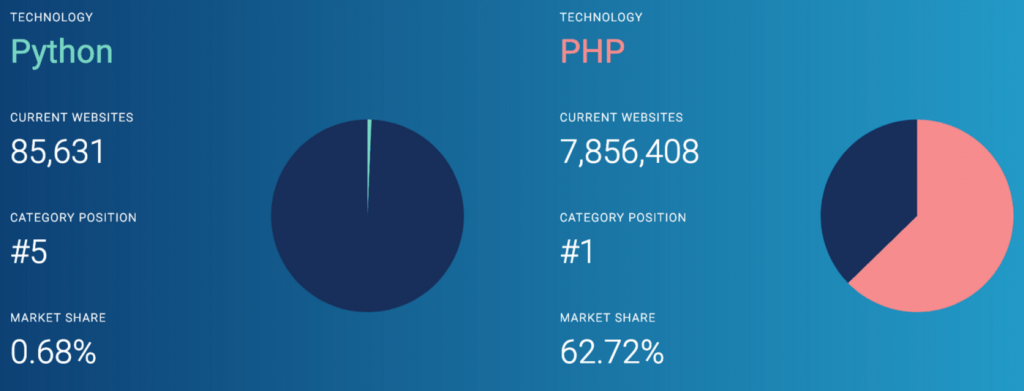
Key Differences in Performance Between PHP and Python
Performance Differences in PHP
Performance Differences in Python
Compare How PHP and Python Interact With Web Development Tools
PHP and Python are both popular choices for web development, and they interact with databases and web development tools in distinctive ways.
PHP Interactions
Python Interactions
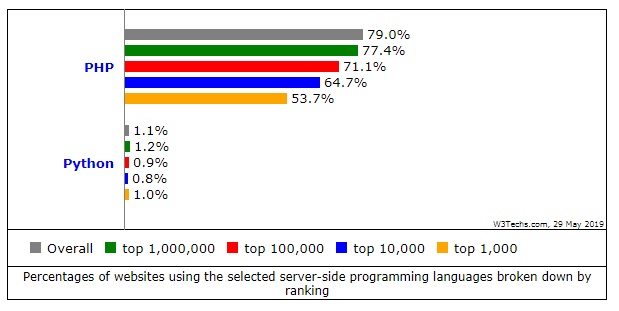
Which Is Better, PHP or Python?
PHP is a server-side programming language created primarily for building websites. It excels in creating dynamic web pages and content management systems (CMS) like WordPress. On the opposite side Python is a general-purpose language known for its versatility and clean, readable syntax. While it is not specifically tailored for web development, it finds extensive applications beyond the web, such as data science, artificial intelligence and scientific computing.
The choice between PHP and Python depends on the specific requirements of your project and your team’s expertise. Some factors to consider include:
If your focus is primarily on web development and you value extensive resources and web hosting support, PHP might be a better fit.
On the other hand, if you seek a versatile language with strong web frameworks and asynchronous capabilities, and you are interested in exploring applications beyond the web, Python presents a compelling case.
What is Python?
What is PHP?
Elements of Python
Elements of PHP
Advantages and disadvantages of Python
Here are the advantages and disadvantages of utilizing Python programming language for web improvement:
Cons of Python
Upsides and downsides of PHP
The following are the top advantages and downsides of involving PHP for web application improvement:
Cons of PHP
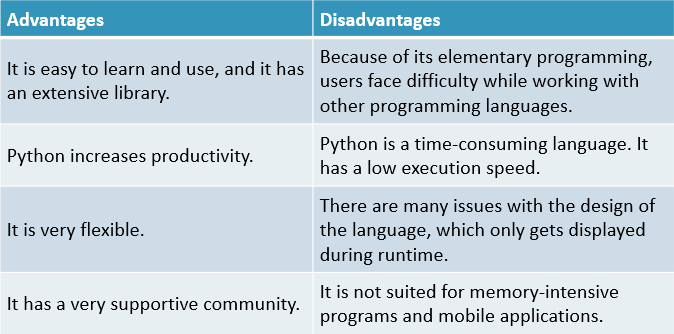
When to Choose Python?
When to Choose PHP?
Why Choose Python?
Python flaunts many benefits, and consequently, it is nowadays’ innovation. Here’s the reason you should choose Python for web advancement:
Why Choose PHP?
Since PHP is a strong programming language, we have a few motivations to pick it:
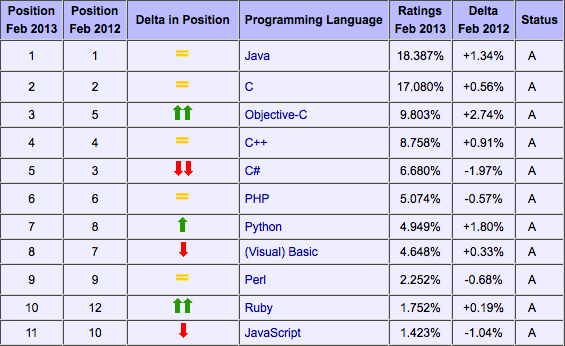
Python versus PHP Detailed Comparison
1. Local area Support
2. Adaptability
3. Convenience
4. Speed to Market
5. Web Frameworks
6. Library Management
7. Security
8. Climate Management
9. Simplicity of Learning
10. Troubleshooting
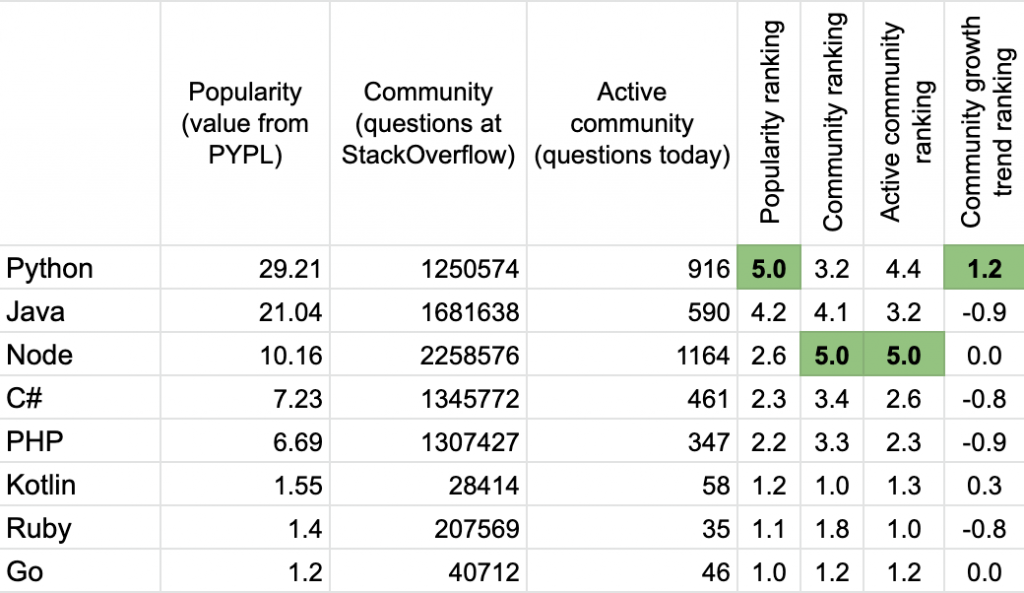
Closing Thoughts
Albeit both PHP and Python perform incredible in web advancement, Python wins over PHP in many focuses. Nonetheless, this doesn’t infer that you need to choose Python and disregard PHP. Both PHP and Python are fantastic programming languages for creating web applications. Finally, it generally relies upon your task needs just as your PHP or Python capacities, data, and aptitude when you are building your web applications.
Why incline toward Python over PHP?
There are many motivations to incline toward Python over PHP for current web application improvement like adaptability, security, elite execution, simple to utilize, basic sentence structure, and so forth
Which is safer, Python or PHP?
With regards to security, Python is a favored decision for organizations. It has numerous security highlights to foster complex applications. Where PHP has had a shocking history with regards to security.
What is Python for the most part utilized for?
Python, a universally useful programming language has a more extensive use including web advancement, AI, ML, huge data, versatile application improvement, game turn of events, and so on.
Conclusion
Python is strong, versatile, open-source, and is moderately simple to learn, and amusing to utilize. It has many elements that other programming dialects don’t uphold. PHP isn’t utilized for broadly useful programming, and is just utilized for making dynamic web content with HTML. Just motivation to stay without breaking a sweat of utilization.


